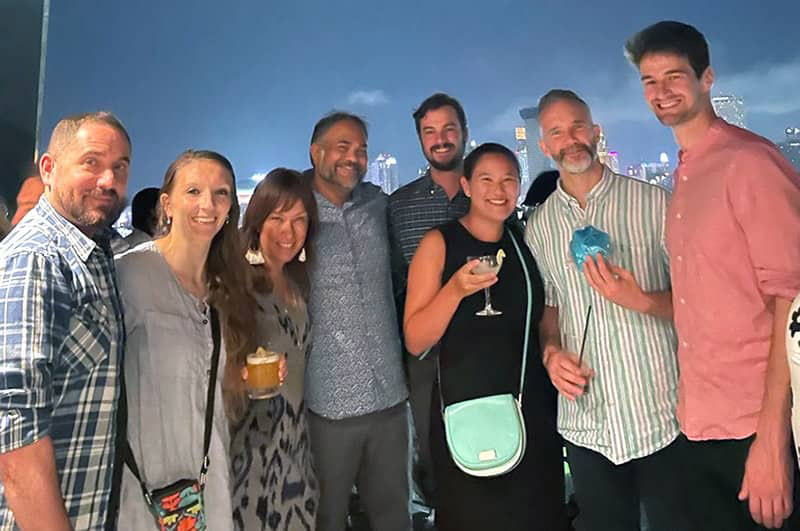
Statement on Racism and Health Disparities
The Tulane Infectious Diseases Section believes that social determinants of health play a central role in medicine, particularly the impact of structural racism on the health of our patients. In the wake of national awareness of racial injustice and a pandemic that has disproportionately affected African Americans, we join the IDSA in calling for reform to eliminate racism and health disparities. In addition, we are committed to providing a diverse and inclusive environment for our faculty, staff, trainees and for people of all genders, races, and sexual orientations.
Equity, Diversity, and Inclusion within the Tulane Infectious Diseases Section
Our commitment to issues of Equity, Diversity, and Inclusion (EDI), health disparities, and racial & social justice guides our values as individuals and as a section. Many of our faculty and fellows choose to come to Tulane to care for a vibrant community, but one that is under-served by the healthcare system and continues to have great medical need. Our clinical practice serving patients who are diverse in terms of race, ethnicity, socioeconomic status, sexual orientation, and more necessitates that we develop cultural competency, understand social determinants of health, and address barriers to care.
In 2020, Dr. Crystal Zheng was appointed the first Diversity Lead for the Section, passing the torch last year to Dr Manny Guajardo. In this role, he is charged with creating educational EDI programming, advocating for diversity in faculty and fellow recruitment, and creating a long-term roadmap for how the Section can achieve its commitment to EDI. As the first sub-specialty section to appoint a dedicated Diversity Lead, the Infectious Diseases Section is at the forefront of EDI work and serves as a role model for other groups within the School of Medicine.
Our efforts are complementary to those of the Tulane School of Medicine’s Office of Graduate Medical Education. We agree with the GME’s position that participation in EDI initiatives produces better trained physicians, that Tulane’s position within the New Orleans community historically highlights both successes and opportunities for improvement, and that the recruitment and retention of individuals underrepresented in the physician workforce is an utmost priority.
Fellowship Program Click ↑ to learn more about the program
Tulane fellows excel in that they are not only medically knowledgeable but also compassionate and socially conscious. The integration of EDI into the fellowship programs begins at recruitment and continues throughout the two-year program.
Interview Process
Our interview process emphasizes holistic evaluation over traditional metrics. In order to reduce the impact of implicit bias on interview evaluations, our interviewers undergo evidence-based implicit bias training before they even meet applicants or create the rank list. Many of our interviewers are interested to discuss patient advocacy and health disparities with applicants. We understand that seemingly objective measures such as GPA and test scores are actually strongly biased. We value traits such as an applicant’s contribution to diversity (broadly defined), fluency in other languages, experiences with healthcare in different geographical areas of the US and other countries, among others. We do not believe an applicant’s chance of attending his/her/their preferred program should be limited by race, sex socioeconomic status, place of birth, or other factors.
Hidden Curriculum
Topics of EDI, health disparities, and social justice are an integral part of both the formal and hidden curriculum at Tulane. One setting in which the hidden curriculum is most evident is at the HIV Outpatient Program (HOP) Clinic at University Medical Center. Originally established in 1987 at Charity Hospital, HOP has provided HIV primary care to thousands of predominantly under-served and minority patients. HOP currently serves over 1,400 people living with HIV (PLWH), which accounts for roughly one-fifth of the New Orleans population of PLWH. The HOP patient population is 80% African American with a large percentage on Medicaid or uninsured.
Fellows will not only learn how to care for the patients’ HIV disease but will also serve as primary care doctors and provide comprehensive care. Fellows will gain experience with eliciting patient needs on history, addressing barriers to care in collaboration with a multi-disciplinary team, and providing empathic and culturally competent care to people of all backgrounds. Fellows also receive formal didactics and experience on providing transgender care.
Formal Curriculum
At HOP, fellows complete a Barriers to Care exercise quarterly. Fellows review their patient panels to identify patients who are lost to follow up or who are not virologically suppressed. They discuss barriers to care with these patients and identify & implement corrective solutions. Results of these interventions are reflected in the next quarter’s data. Fellows also have the option of pursuing a more formal quality improvement project at HOP if they are interested in implementing systemic interventions.
The entire Section including faculty and fellows participate in a Health Disparities Workshop. During this popular workshop, participants learn how to list health disparities, identify root causes, and propose solutions. At the end of the workshop, the group selects one solution to implement over the course of the year. In 2021, the Infectious Disease Section committed to creating a pipeline shadowing program for minority students to address the disparity of representation from people of color within the ID workforce. The slides to this workshop are freely available and have been incorporated into the EDI curriculum in multiple other institutions. Please attribute Dr. Crystal Zheng if you would like to adapt the workshop to your institution.
Fellows select articles relating to EDI, health disparities, or social justice to present in weekly journal club conference. Topics include disparities in COVID-19 outcomes, racism in academic medicine, and the impact of implicit bias on patient care.
Additional educational resources are highlighted throughout the year, particularly surrounding Black History Month, Asian Pacific American Heritage Month, and Juneteenth.
Publications from the Infectious Disease Section relating to racial & social justice:
Let’s Join the Lane: The Role of Infectious Diseases Physicians in Preventing Gun Violence
I’m an infectious disease doctor and I’m afraid to go to work (and it’s not because of Coronavirus)
